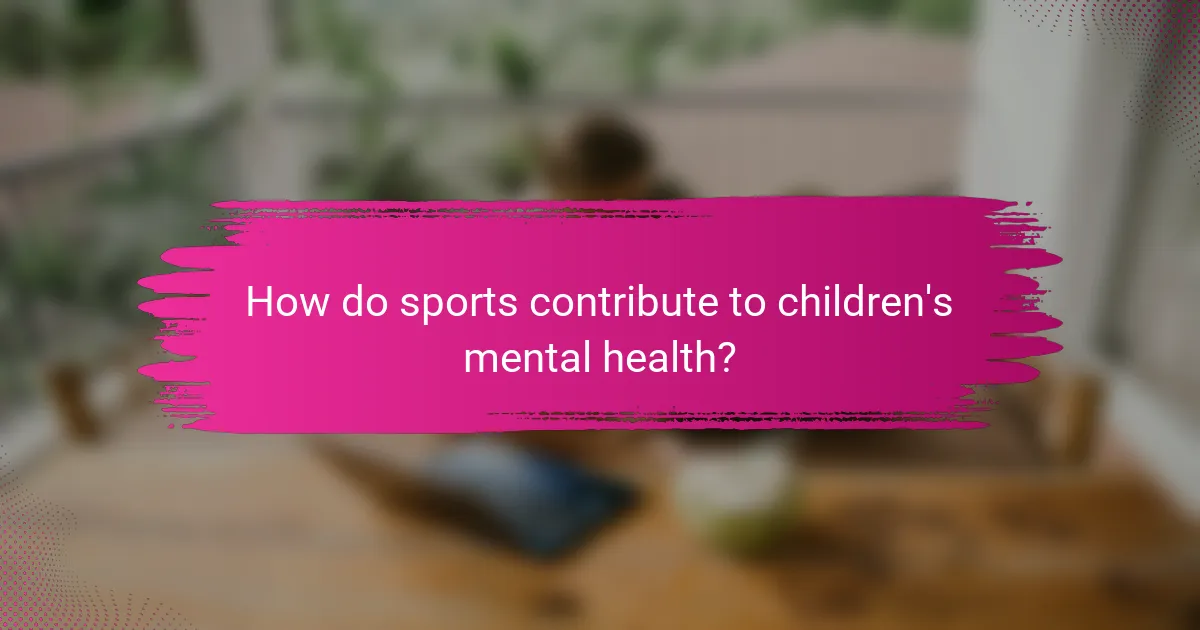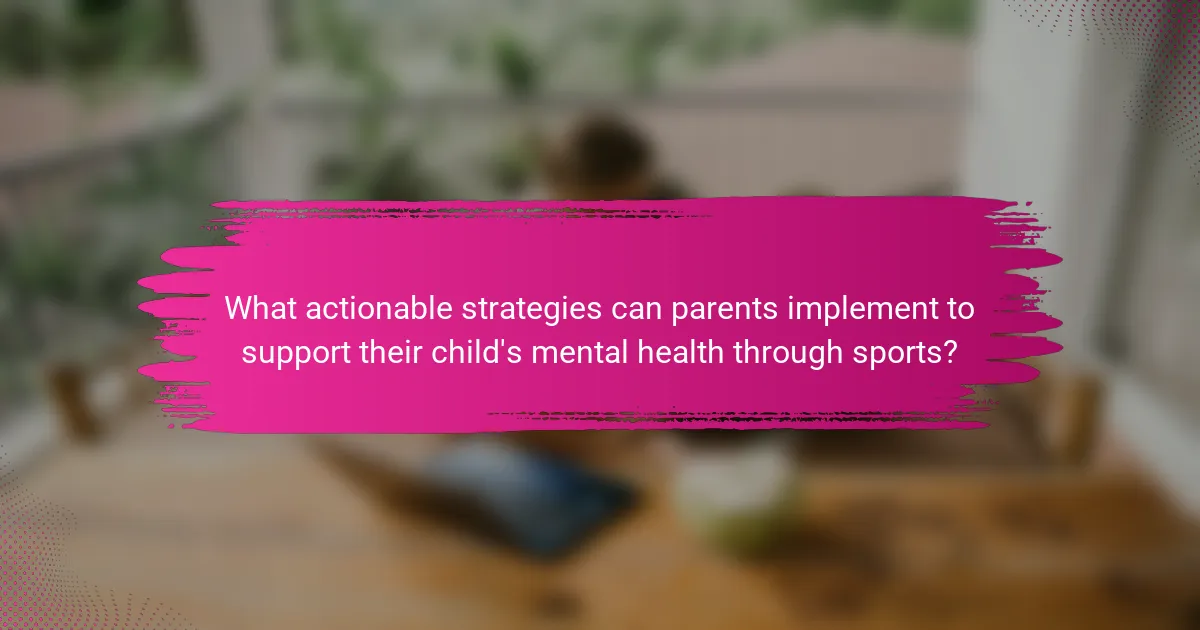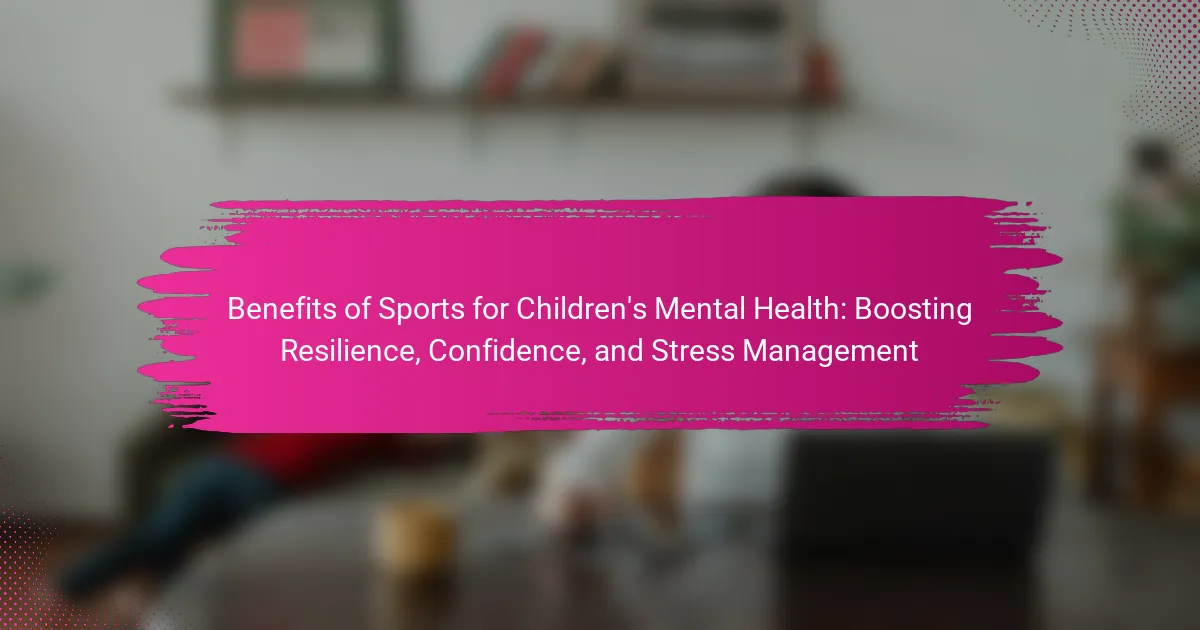Sports play a crucial role in enhancing children’s mental health by boosting resilience, confidence, and stress management. Engaging in physical activities fosters social connections and emotional support. Participation in team sports develops coping skills and problem-solving abilities. Regular involvement in sports is linked to lower rates of anxiety and depression, contributing to overall well-being.

How do sports contribute to children’s mental health?
Sports significantly enhance children’s mental health by boosting resilience, confidence, and stress management. Engaging in physical activities helps children develop coping skills and a sense of achievement.
Participation in team sports fosters social connections, which are vital for emotional support. Children learn to navigate challenges, enhancing their problem-solving abilities.
Research indicates that regular physical activity reduces symptoms of anxiety and depression, promoting overall well-being. Children who play sports often report higher self-esteem and improved mood.
Additionally, sports provide structured routines, which can help children manage stress effectively. This structure contributes to a sense of stability and predictability in their lives.
What are the key benefits of sports for mental development?
Participating in sports significantly enhances children’s mental development by fostering resilience, confidence, and effective stress management. Sports provide structured environments where children learn to face challenges and overcome obstacles, building their resilience. Regular participation boosts self-esteem, as children experience personal achievements and teamwork. Additionally, engaging in sports offers a healthy outlet for stress, helping children develop coping mechanisms that can be beneficial throughout their lives.
How does participation in sports boost resilience in children?
Participation in sports significantly boosts resilience in children by fostering coping skills and emotional strength. Engaging in team sports teaches children how to handle setbacks, enhancing their ability to bounce back from challenges.
Sports participation promotes social connections, which provide emotional support during difficult times. Children learn teamwork and communication, building confidence and a sense of belonging. This supportive environment encourages them to face adversities with a positive mindset.
Moreover, physical activity releases endorphins, which improve mood and reduce stress. As children experience success in sports, they develop a growth mindset, viewing challenges as opportunities for improvement rather than obstacles.
Overall, the unique attributes of sports, such as teamwork, emotional regulation, and physical health, contribute to building resilience in children, preparing them for life’s challenges.
What skills contribute to resilience through sports?
Sports cultivate essential skills that enhance resilience in children. Key skills include teamwork, adaptability, goal-setting, and stress management. Teamwork fosters collaboration and social support, crucial for overcoming challenges. Adaptability enables children to adjust to changing circumstances, enhancing their problem-solving abilities. Goal-setting instills a sense of purpose, motivating children to persevere through difficulties. Stress management techniques learned through sports help children cope with pressure effectively, contributing to their overall mental health.
In what ways do sports enhance children’s confidence?
Sports significantly enhance children’s confidence by promoting teamwork, skill development, and a sense of achievement. Engaging in sports helps children set and achieve goals, which boosts their self-esteem. For example, mastering a new skill or winning a game fosters a sense of accomplishment. Additionally, social interactions in team settings build communication skills and resilience, further reinforcing their confidence. Studies show that active participation in sports correlates with higher self-confidence levels among children, making sports a vital component of their mental health development.
How does achievement in sports translate to self-esteem?
Achievement in sports significantly enhances self-esteem in children. Success in athletic activities fosters a sense of accomplishment, which directly boosts confidence. As children overcome challenges in sports, they develop resilience, learning to cope with setbacks. This process improves their ability to manage stress and anxiety. Studies show that children involved in sports report higher self-esteem levels compared to those who are not. Engaging in team sports also promotes social connections, further reinforcing positive self-image.
What role does sports play in stress management for children?
Sports play a crucial role in stress management for children by promoting physical activity, social interaction, and emotional resilience. Engaging in sports helps children release endorphins, which reduce stress and improve mood. Additionally, teamwork and competition foster a sense of belonging and enhance self-esteem, further contributing to mental well-being. Research shows that children who participate in sports exhibit lower levels of anxiety and improved coping strategies. Regular physical activity can also lead to better academic performance, creating a positive feedback loop that supports stress management.
What techniques do coaches use to help children manage stress?
Coaches employ various techniques to help children manage stress effectively. These include teaching relaxation methods, fostering a supportive environment, and encouraging open communication.
Relaxation techniques such as deep breathing and visualization help children calm their minds. Creating a supportive team atmosphere boosts confidence and reduces anxiety. Coaches also promote open dialogue about feelings, allowing children to express concerns and receive guidance.
Incorporating these strategies not only enhances children’s resilience but also contributes positively to their overall mental health.

What universal attributes do sports provide for mental health?
Sports significantly enhance children’s mental health by fostering resilience, boosting confidence, and improving stress management. Participation in sports helps develop coping strategies and emotional regulation. Engaging in physical activity releases endorphins, which reduce stress and anxiety. Additionally, team sports cultivate social skills and provide a sense of belonging, further supporting mental well-being. Studies indicate that children involved in sports exhibit lower rates of depression and higher self-esteem, showcasing the profound impact of athletic participation on mental health.
How does teamwork in sports foster social skills?
Teamwork in sports significantly enhances children’s social skills by promoting communication, cooperation, and empathy. Engaging in team activities fosters a sense of belonging and encourages children to navigate social dynamics effectively. As a result, children develop critical interpersonal skills, such as conflict resolution and active listening. These experiences contribute to improved resilience and confidence, vital components of mental health. Research indicates that children involved in team sports exhibit higher self-esteem and better stress management abilities, reinforcing the positive impact of teamwork on their overall development.
What are the cognitive benefits of engaging in sports?
Engaging in sports boosts children’s cognitive abilities, enhancing resilience, confidence, and stress management. Sports participation fosters teamwork and discipline, which are vital for mental growth. Studies show that regular physical activity improves focus and academic performance. Additionally, children learn to cope with challenges, building emotional strength and reducing anxiety.

What unique attributes do specific sports offer for mental health?
Specific sports offer unique attributes that enhance children’s mental health. Team sports foster social connections, boosting resilience and confidence. Individual sports promote self-discipline, aiding in stress management. For example, martial arts teach focus and emotional control, while soccer enhances teamwork and communication skills. These attributes contribute to overall mental well-being and personal development.
How does individual sports participation differ from team sports in mental benefits?
Individual sports participation enhances self-reliance and personal achievement, while team sports foster social connections and collaboration. Individual sports, like swimming or running, build resilience through personal goal-setting and self-discipline. In contrast, team sports, such as soccer or basketball, develop confidence through teamwork and shared victories. Both types improve stress management, but the social support in team sports may offer additional emotional benefits.
What unique mental health benefits do endurance sports provide?
Endurance sports uniquely enhance mental health by fostering resilience, increasing confidence, and improving stress management. These activities promote the release of endorphins, which elevate mood and reduce anxiety. Studies show that children participating in endurance sports exhibit greater emotional regulation and coping skills. Additionally, consistent engagement in these sports builds a sense of achievement, reinforcing self-esteem and social connections, which are vital for mental well-being.

What rare attributes of sports can impact mental health?
Engaging in sports can significantly enhance children’s mental health through rare attributes like social connection and emotional expression. These elements foster resilience, confidence, and effective stress management. For instance, team sports encourage collaboration, which builds social skills and emotional support networks. Additionally, sports provide a safe outlet for expressing emotions, helping children process feelings constructively. These unique aspects contribute to a holistic improvement in mental well-being, making sports a vital component of childhood development.
How can competitive sports lead to increased anxiety in some children?
Competitive sports can increase anxiety in some children due to pressure to perform and fear of failure. High expectations from coaches and parents may create stress, leading to heightened anxiety levels. The competitive environment can amplify feelings of inadequacy, especially if a child struggles to meet performance benchmarks. Additionally, the social dynamics of team sports can contribute to anxiety, as children may fear judgment from peers. Understanding these factors is crucial for promoting a healthy sports experience that prioritises mental well-being.
What are the less common mental health challenges faced by young athletes?
Young athletes may face less common mental health challenges such as performance anxiety, identity struggles, and burnout. These issues can stem from high expectations, intense competition, and the pressure to excel. Performance anxiety can manifest as fear of failure, affecting their confidence and enjoyment of sports. Identity struggles arise when athletes overly associate their self-worth with their athletic performance, leading to emotional distress. Burnout occurs when the demands of training and competition exceed their ability to cope, resulting in exhaustion and disengagement from the sport. Addressing these challenges is crucial for promoting overall mental well-being in young athletes.

What actionable strategies can parents implement to support their child’s mental health through sports?
Engaging in sports provides parents with actionable strategies to enhance their child’s mental health. Sports foster resilience, build confidence, and improve stress management skills.
Encourage regular participation in team sports to promote social connections, which can reduce feelings of isolation. Create a supportive environment by celebrating achievements, regardless of size, to boost self-esteem. Incorporate mindfulness practices such as breathing exercises before games to help children manage anxiety.
Set realistic goals for athletic performance to cultivate a growth mindset, emphasizing effort over results. Lastly, facilitate open discussions about emotions related to sports experiences, allowing children to express their feelings and learn emotional regulation.
What are the best practices for encouraging a healthy sports experience?
Encouraging a healthy sports experience for children involves promoting resilience, confidence, and effective stress management. Focus on creating a supportive environment that emphasizes teamwork and personal growth.
1. Foster a positive atmosphere by celebrating effort over outcome.
2. Encourage regular feedback to build confidence and address concerns.
3. Promote inclusivity to ensure all children feel valued and engaged.
4. Integrate relaxation techniques to help manage stress effectively.
5. Set realistic goals to boost resilience and avoid undue pressure.
What common mistakes should parents avoid in youth sports?
Parents should avoid overemphasizing competition, neglecting communication, and dismissing the importance of fun in youth sports. Overemphasis on competition can lead to anxiety and decreased resilience in children. Open communication fosters confidence and helps children express their feelings about sports. Prioritizing enjoyment promotes long-term engagement and mental health benefits.
How can parents communicate effectively with coaches about mental health?
Parents can communicate effectively with coaches about mental health by fostering open dialogue and collaboration. Establishing a relationship based on trust allows for sharing observations about their child’s behavior and emotional state. Regular check-ins can facilitate discussions about the child’s progress in sports and overall well-being.
Encouraging coaches to integrate mental health awareness into training sessions can enhance resilience and confidence in young athletes. Providing resources or suggesting workshops on mental health can further support this initiative.
Listening to coaches’ insights on the child’s performance and emotional responses during sports can help parents understand how to best support their children. This collaborative approach ultimately promotes a healthier sports environment.
Effective communication about mental health can lead to improved stress management strategies for children, enhancing their overall sports experience and personal growth.


